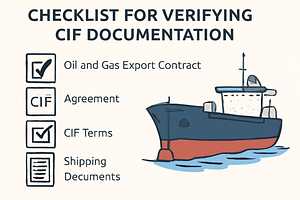
Smart Oil Deals: From Inquiry to Final Contract
How to structure oil trade deals?
Making a successful oil deal isn’t about luck—it’s about structure. From the first message to the final contract, every step matters. If you skip one, you may lose time, money, or even your reputation. So let’s break down the exact stages of a smart oil and gas trade deal in simple words.
Start with a Clear Inquiry
When you first contact a seller or buyer, don’t be vague. The inquiry message sets the tone.
What to include in a proper inquiry:
- The type of fuel you want (like EN590, LNG, or Jet A1)
- The quantity needed
- Preferred port of delivery
- Required delivery timeline
- Quality standards (such as sulfur ppm, etc.)
Being specific shows you’re serious—and it filters out time-wasters.
Offer Presentation: Look for Proper Documentation
If a seller replies with an offer, it must look professional. Offers made over casual chat or not on company letterhead should be ignored.
What a legit offer should include:
- Full product specifications
- Price breakdown (with terms like FOB, CIF, etc.)
- Payment terms (LC, SBLC, TT, etc.)
- Delivery timelines
- Validity period of the offer
- Official letterhead with contact information
Do Your Market Check
Before you move forward, you must check if the deal matches the market. This step is called market verification, and it saves you from fake prices.
Sources to check real market rates:
- Platts
- Argus Media
- Trusted brokers or mandates in your network
Example: If the current FOB price for EN590 is $600/MT, and someone offers $350/MT—something is clearly wrong.
Understand Payment Terms Clearly
Payment terms protect both sides. But scammers often use tricky language to get your money without giving you anything in return.
Red flags in payment terms:
- Requests for upfront fees without documentation
- Strange escrow arrangements
- No use of Letters of Credit (LC)
- Refusal to provide draft contract before payment
In real oil deals, everything is clearly documented and bank instruments are used.
Contract Phase: Protect Both Parties
Once everything looks right, it’s time to sign the contract. This is the most sensitive step because one wrong word can cause big losses later.
What to include in a strong contract:
- Exact fuel specification and quantity
- Delivery and inspection terms (SGS, Bureau Veritas, etc.)
- Payment method and timelines
- Penalties for delays or breach
- Dispute resolution process
Use your legal team to review the draft before signing.
Verification Before You Commit
Even if the offer looks good, always do background checks.
How to verify the seller or buyer:
- Ask for company registration documents
- Request trade references
- Cross-check contact info from their website
- Look up the company on LinkedIn and Google
A simple check can save you from months of wasted effort or legal trouble.
Real World Tips from Experts
Many experienced traders follow an internal checklist to make sure every step is verified. You can create your own or use one from a trusted consultant or training program. Don’t rely on shortcuts.
Remember, in this industry, the people who follow process always win in the long run.
You’re Ready for More? Join the Full Training



